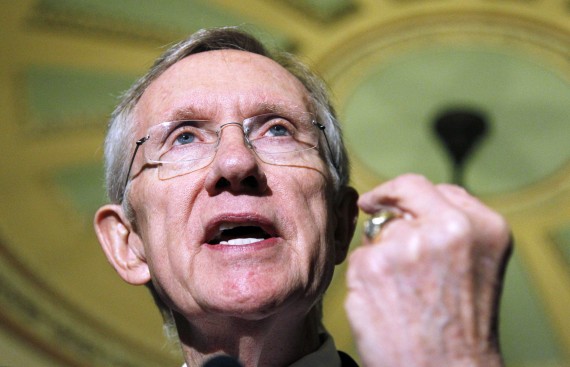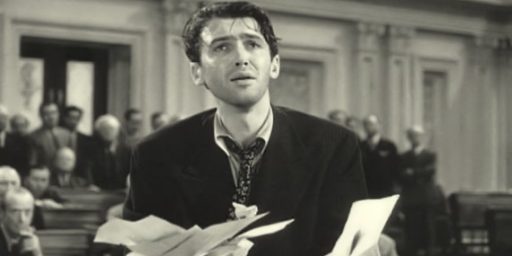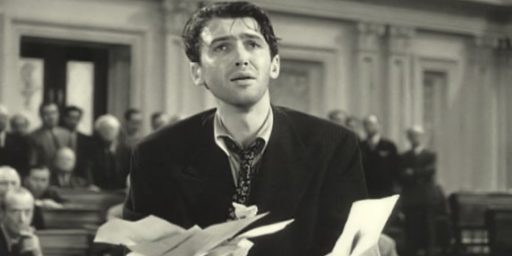Reid Triggers Nuclear Option Lite
Harry Reid is playing hardball, invoking a tactic that he himself decried being threatened when Republicans were in charge.
Harry Reid is playing hardball, invoking a tactic that he himself decried being threatened when Republicans were in charge.
Alexander Bolton, The Hill (“Reid triggers ‘nuclear option’ to change Senate rules, end repeat filibusters“):
In a shocking development Thursday evening, Senate Majority Leader Harry Reid (D-Nev.) triggered a rarely used procedural option informally called the “nuclear option” to change the Senate rules. Reid and 50 members of his caucus voted to change Senate rules unilaterally to prevent Republicans from forcing votes on uncomfortable amendments after the chamber has voted to move to final passage of a bill. Reid’s coup passed by a vote of 51-48, leaving Senate Republican Leader Mitch McConnell (R-Ky.) fuming.
The surprise move stunned Republicans, who did not expect Reid to bring heavy artillery to what had been a humdrum knife fight over amendments to China currency legislation.
The Democratic leader had become fed up with Republican demands for votes on motions to suspend the rules after the Senate had voted to limit debate earlier in the day. McConnell had threatened such a motion to force a vote on the original version of President Obama’s jobs package, which many Democrats don’t like because it would limit tax deductions for families earning over $250,000. The jobs package would have been considered as an amendment. McConnell wanted to embarrass the president by demonstrating how few Democrats are willing to support his jobs plan as first drafted. (Senate Democrats have since rewritten the jobs package to pay for its stimulus provisions with a 5.6 surtax on income over $1 million.)
Reid’s move strips the minority of the power of forcing politically-charged procedural votes after the Senate has voted to cut off a potential filibuster and move to a final vote, which the Senate did on the China measure Tuesday morning, 62-38. Reid said motions to suspend the rules after the Senate votes to end debate — motions which do not need unanimous consent — are tantamount to a renewed filibuster after a cloture vote.
Phillip Klein, Washington Examiner (“Reid rewrites Senate rules with shocking move“):
In a stunning turn of events this evening, Senate Majority Leader Harry Reid, D-Nev., used an arcane legislative maneuver to effectively rewrite Senate rules to make it harder for the minority party to force uncomfortable votes on the majority.
[…]
Though it’s been the standing practice of the Senate to allow such motions by the minority, tonight Reid broke with precedent and ruled McConnell’s motion out of order, and was ultimately backed up by Democrats.
So, the end result is that by a simple majority vote, Reid was able to effectively rewrite Senate rules making it even harder than it already is for the minority party to force votes on any amendments. Should Republicans retake the Senate next year, it’s something that could come back to haunt Democrats in a major way.
And just to clear up some confusion, what happened tonight was different than the so-called “nuclear option” to end filibusters. While triggering the “nuclear option” requires a Majority Leader to use the same sort of strategic maneuvers as Reid just did, tonight’s move had to do with the amendment process, not filibusters.
Ryan Grim and Michael McAuliff, HuffPo (“Harry Reid Busts Up Senate Precedent“)
Senate Majority Leader Harry Reid (D-Nev.) led Democrats in a precedent-setting move on Thursday evening, shutting down an effort by Senate Minority Leader Mitch McConnell (R-Ky.) to hijack the floor and force the chamber to move away from debate on Chinese currency manipulation and instead vote on President Obama’s American Jobs Act.
The move raises all sorts of questions: Why would the Republicans, rather than the Democrats, be insisting on having the vote that the president has been demanding for weeks? What does Reid’s move say about the filibuster? And why is the Senate debating a bill on Chinese currency anyway, one that the White House opposes and stands little chance in the House?
Senate Republicans, aware that some Democrats facing reelection are unwilling to vote for a jobs package that includes tax hikes on the wealthy, wanted to stage a vote to demonstrate the lack of party unity. But the chamber had already voted to move forward on a bill aimed at curtailing Chinese currency manipulation, which depresses the price of Chinese imports and hurts American manufacturers. That meant the chamber was in what’s known as a post-cloture period.
McConnell moved to suspend the rules and shift debate over to the American Jobs Act. Reid argued that doing so amounted to another filibuster, because it required 60 votes to move back to the original bill, and so therefore was out of order. Sen. Mark Begich (D-Alaska), who happened to be the presiding officer at the time, asked the Senate parliamentarian what he thought. The parliamentarian advised Begich that McConnell’s motion was in order.
Reid then appealed the ruling, following a script that advocates of ending the filibuster wrote long ago. What some senators call the “constitutional option,” and what others call the “nuclear option,” involves as a first step appealing a ruling that a filibuster is in order. The second step is to defeat a motion to table that appeal, which is exactly what happened next, with all but one Democrat sticking with Reid. (Sen. Ben Nelson (D-Neb.) voted against Reid; Sen. Barbara Boxer (D-Calif.) didn’t vote.)
With the chair overruled, McConnell’s motion was declared out of order, setting a narrow precedent that motions to suspend the rules are out of order during a post-cloture period.
But it also set a more important precedent. The advice of the parliamentarian is considered sacrosanct in the Senate. Reid’s decision to overrule him opens a gate to similar efforts that could also be done by majority vote. Republicans were quickly threatening to use the new power once they return to the majority. (Reid was a proponent of filibuster reform in 2010, but didn’t pursue an effort earlier this year to reduce the number of votes needed in the Senate to move legislation forward.)
Andrew Stiles, National Review‘s The Corner (“Reid’s Power Play“):
As I mentioned earlier, tonight Senate Majority Leader Harry Reid (D., Nev.) threw what might be described as a procedural temper tantrum. The Senate was prepared to vote on final passage of a China currency bill that was certain to pass, as cloture had already been invoked by a 62-38 vote.
Under Senate rules, the minority party is allowed to offer amendments to a piece of legislation following cloture, provided that the amendments are relevant, or “germane,” to the legislation under consideration. Senate Minority Leader Mitch McConnell (R., Ky.) had been attempting all week to force a vote on President Obama’s job bill. After all, the president had repeatedly chastised Congress for failing to take it up. However, Reid didn’t have unanimous Democratic support for the jobs bill as is, and so was seeking to avoid such an embarrassing vote. He had already blocked attempt to bring the bill to a vote earlier this week.
[…]
“This is an outrage!” Sen. Roger Wicker (R., Miss.) protested as members were casting their votes. When the ruling was formally approved, an impassioned back and forth ensued. “We are fundamentally turning the Senate into the House,” said a visibly irritated McConnell. “The rules of the Senate will be effectively changed to lock out the minority party even more.”
Even Reid seemed aware of the magnitude of his decision. “What just took place here is an effort to expedite what goes on around here,” he said. “Am I 100 percent confident that I’m right? No. But I feel pretty comfortable with what we’ve done.”
Indeed, Reid had opted for the so-called “nuclear option,” to toss history and precedent aside and change the rules of the Senate, all to avoid having to vote on a jobs plan the president has repeatedly called on Congress to pass. Instead, Reid intends to hold a vote next week on an amended version of the bill that includes a 5.6 percent “millionaire surtax” to cover the bill’s $450 billion price tag.
The implications of Reid’s play tonight should not be understated. In theory, there is nothing preventing the Senate from using this same tactic to do away with any number of rules, including the 60-vote requirement to break a filibuster. In fact, many liberals have been clamoring for Reid to do just that in order to ram through controversial agenda items like Obamacare or a second, even larger stimulus package. Reid has established a firm precedent that will not soon be forgotten.
Given the increasingly high likelihood that Republicans will regain control of the Senate in 2012, this was an especially risky maneuver for Reid to pull. Both parties tend to accept and abide by the Senate rules, knowing that any election cycle could relegate them to minority status, in which case they want protections like the one Reid just eliminated to remain in place. Senate Republicans are livid, and understandably so. If they do take power in the coming election, and, for example, Obamacare repeal comes before the Senate, things could get pretty interesting.
In terms of the specific case, I’m quite sympathetic to Reid’s move here. It doesn’t strike me as hypocritical, in that eliminating the filibuster altogether–or even just on Supreme Court nominations–is a much more fundamental step than limiting serial filibusters on the same motion. A precedent-setting maneuver is sometimes the only viable response to the unprecedented abuse of the procedures.
So, Klein gets it right here: this isn’t quite the “nuclear option” that we were debating years ago. Call it “nuclear option lite.”
On the other hand, Stiles makes a reasonable point: just because changing the rules was arguably justifiable here, there’s no guarantee whatsoever that this precedent won’t be applied in sinister ways in the future. Indeed, Reid himself seems to understand that.
As an aside, it is somewhat amusing that the thing that drove Reid to the mat here was the prospect of being forced to schedule an up-or-down vote on the jobs bill that his party’s president is pushing so hard.







Not exactly the OWS crowd.
It’s not really electoral suicide to vote for something that has the support of 70-80% of American voters.
I don’t think “unilaterally” means what you think it means James.
“just because changing the rules was arguably justifiable here, there’s no guarantee whatsoever that this precedent will be applied in sinister ways in the future.”
I think the opposite is true. The argument for changing the rules in this particular case are quite weak, but the need to do something like this to change the way the Senate has operated the last few years is absolutely essential. The only thing Reid did wrong here was not taking the opportunity to do away with the filibuster itself. And I say that as someone who likes the filibuster in principle.
Look, the Democrats are certainly guilty over the last decade of using the filibuster more than the historical norm, but Republicans have almost totally corrupted the very idea of the filibuster. Not only have they used it to require a 60 vote majority on virtually anything of consequence, something that goes against all established practice and tradition, but during the final two years of the Bush II administration the GOP in the Senate on several occasions filibustered bills EVEN THOUGH THEIR OWN PRESIDENT COULD VETO THEM AND THERE WAS NO CHANCE OF HIS VETO BEING OVERRIDEN.
Mike
So does this mean every little vote in the Senate won’t require a 60-vote majority?
Shocking.
Does this shorten to “oh noes, we might have democracy?”
@Davebo: That’s a report from The Hill that I’m directly quoting. It’s poorly written but he’s saying it was done without regard to the usual bipartisan process for changing rules.
@john personna: Not exactly the OWS crowd.
Np, it;s there mommies and daddies. But it will mean less child support for the OWS babies.
@john personna: Our system was clearly designed to be something other than purely majoritarian. The filibuster is actually a pretty sound check. But it’s one that depends on the integrity of the minority to deploy only on matters of major principle. Given that that expectation is now almost laughable, it may be time to retire it.
@James Joyner:
Concur.
@JKB:
You might be thinking of your daddy’s recession 😉
@ponce:
Polls are often a paradox in their measurements of public sentiments. For instance, it is true that a majority of those polled appear to favor taxing the ‘rich’ more. However, when asked if they think taxing the ‘rich’ will produce more jobs, the majority also says ‘No.’ And, since the burning issue, on the minds of people these days, is the economy, one has to question how strongly people really support taxing the ‘rich’ when they also feel such an action would have no positive effect on job formation, hence improving this jobless economy.
It’s this type of Congressional gaming, IMO, which downgrades the Congress’s credibility of supposedly doing honest work for the people. It’s like an Onion story to have a democratic controlled Senate balk at an up and down vote on a bill being aggressively pushed by their democratic president. And, then after the bill is successfully blocked the democratic president has a news conference blaming the republicans in congress for obstructing the passage of his bill?????
It shouldn’t be a problem then when the tables are turned and the same tactics are used to repair any damage being done now.
@jan:
Yikes! This is why ideologues can never, truly, believe in democracy.
People may think they think something, but in the words of another sort of ideologue, it is “false consciousness.”
@jan:
You’ve framed it incorrectly. How many folks would be bent out of shape if the rich were taxed more? Answer: Damned few.
Maybe those cute little Democrats are growing some cajones.
@rodney dill:
Sure there’d be a problem for those on the receiving end, but if you’re saying turnabout is fair play — absolutely.
@ Jan…
So you want job creation. And you want Government spending to not add to the deficit…in other words be revenue neutral. But you don’t want to increase revenues even a tiny bit above the current historically low rates. So that leaves cutting spending. Which slashes jobs. Which raises un-employment. So you want job creation.
But yeah…you’re right…tax increases don’t create jobs.
They should simply go back to an old school filibuster that requires the spectacle of a senator holding the floor talking continuously. Less because it requires endurance and more because it makes it incredibly visible when a senator filibusters and hence will better penetrate the mind of voters just how ridiculously the GOP has employed this tactic.
The filibuster is an important check on majority power, but it needs to come with a cost to prevent… well to prevent exactly where we are now.
@James Joyner: Amen and amen. Ditto to Hey Norm, though I can’t tell from their post whether or not they think this is a good thing. I remember reading somewhere the Speaker Gingrich once said, “We can win the House, but first we have to break it,” or something along those lines. The House and the Senate both used to basically be old boys’ clubs with unspoken rules and precendent that governed abuse of the rules. We’re in a transitory phrase where the old boys are being replaced with women and minorities, but somehow aren’t sure whether or not sticking with the gentlemen’s agreements is a good idea.
Jan,
Wrong as usual.
The latest jobs numbers came out today, and the government had to lay off 35,000 workers last month, mostly teachers.
Those teachers could have kept their jobs had we been taxing the rich more.
@jan: Shorter Jan: “The vast majority of Americans say they favor taxing the rich, but I know that deep down they don’t really favor it, so congress shouldn’t listen to what they say, but what I say they mean.”
What is justifiable to use this tactic is in the eye of the beholder. If it can be use here for some lame reason then certainly it would be justifiable to use it to get administration and court nominees an up or down vote.
@jan wrote:
It always amazes me how the people who are the first to decry Keynesian theory are also the same ones who always point out that people don’t rationally think when answering polls (or when they vote).
Given the current makeup of the GOP, does “bipartisan” even have any meaning? This crew is not interested in working together for the good of the country, or in governing at all for that matter. They function more like a gang on a crazed vandalism spree…
@jan: Good job on the partisan reading there. This was in response to a political stunt by the GOP, forcing a vote on an older version of the jobs bill, not the current one the Democrats have been working on. In no way can this be considered a good faith attempt by the GOP to legislate.
The GOP can absolutely be blamed for obstructing the passage of the jobs bill, as they don’t actually support either version of the bill and certainly aren’t going to cooperate and negotiate to pass something to help the economy.
@john personna:
The suggestion that is a big difference between what many people claim to believe and what they must actually believe based on how they act is hardly limited to ideologues. Anyone who’s ever met more than a handful of humans should have noticed that.
Gee.. The Dems are working on a jobs bill? I’ve read what they call a jobs bill. It’s a soak the rich bill…. which kills jobs. And the filibuster is a political trick?
Yeah, right.
@David M:
So, the Obama’s American Job’s Act before Congress means nothing! Instead, a vague, unfinished one that the dems are working on should be put in front of the real bill?
I’m sorry that’s not how it works.
The partisan reading is all yours, David, as people vote on what is written in a legitimate bill before the Congress. The prez has been on a nationwide tour demanding his bill be passed, not another rendition of the original bill that is being created in the wings or back rooms of the democratic caucus.
So, the republicans were obliging the president’s repeated calls for “Pass this Bill!!”. Yes, they knew the dems didn’t have the votes. Durbin said that last week. But, it was a political gesture to give the president his ‘due,’ so to speak. The R’s were calling him on his rhetoric, as well as the dems. It was a “put up or shut up” kind of deal, which was warranted after listening to so many Obama speeches calling for such an action. But, the gutless D wonders, didn’t like Obama’s bill either. So, all they could do was stall on voting on the original one, while they busied themselves in manufacturing another version, all the while pointing fingers at the R’s saying they were obstructing the bill. Now that’s a political stunt!
And, you David, you are the one regurgitating the other side of the aisle’s talking points.
@jan: Do you honestly believe that? You seriously think major legislation like this is just proposed by the president, and then passed without modifications or negotiation with congress?
It takes a strange, strange worldview to see the Senate Democrats are working to pass a bill proposed by a Democratic president as a problem for the Democrats. The GOP will be the ones responsible for obstructing it’s passage, no matter how scared you are of the truth.
@jan:
Don’t be a ditz. That’s exactly how it works. Here’s an idea — why don’t you give us your understanding of the term ‘real bill’. I know we’d all profit from that.
@sam:
There is only one bill pending in the Senate that has been written and signed by Obama. This is entitled the America Job’s Act. There is “talk” of another one being written, one including a 5% millionaires tax, churning around in an embryonic state. That is a non-bill…so far.
@David M:
The president was not going around the country saying, “Pass a version of my job’s act.” No he was simply saying, “Pass this bill!” period, with no references made that it needed any changes. He felt his would do the job of creating jobs. That has been the essence of all that barnstorming. And, that was the reason the R’s wanted to bring ‘his’ bill up for a vote.
And, as far as modifications or negotiations, what about that health care bill that was passed on Christmas eve, with arm twists and promises made as carrots to hold-out democrats, with nary a republican vote on this major piece of life-changing legislation — one that the public is still holding it’s collective nose over and wanting repealed? That one rammed-though bill, alone, has altered Obama’s agenda from going forward, created the 2010 midterm wipe-out of the dem majority in the House and state Houses across the country, and literally dissolved trust in the dems.
Oh please, and to think you seem to get offended when people accuse you of merely repeating talking points…the Democrats lost seats in 2010 because of the bad economy…and as far as how PPACA was passed, were you as equally mortified with how Medicare Part D was passed? There’s a reason that legislating has been compared to making sausage…maybe you just haven’t heard of that…
@An Interested Party:
Take the blinders and ear muffs off, because your senses are so off base.
People were outraged by the healthcare bill! When the House dems who voted for the health care bill ran for office, they also tried to run away from that vote, as it was a lethal indictment against their chances for reelection.
You are either a spinner or just plain ignorant!
I was very much against Medicare Part D. Fiscally speaking, it was one of Bush’s most idiotic moves.
Hate to break this to you hon, but Presidents sign bills after they have been passed, not before.
@jan: Sorry, sweetie, but multiple exclamation points don’t help you make your case…why don’t you try finding some facts…
@jan: I would like to point out how flat-out crazy seeing the health care reform as the reason the Democrats lost their House majority is. That is the same as saying that the Democrats would have kept the house even with the bad economy if they hadn’t passed HCR. Or that they would have still lost the House no matter how much the economy improved and the unemployment rate had dropped very quickly.
Remember, the PPACA was a moderate bill, the only reason Jan thinks it wasn’t is because the GOP made a political choice to portray it as partisan. Policy wise it was a fairly incremental change that included many conservative ideas.